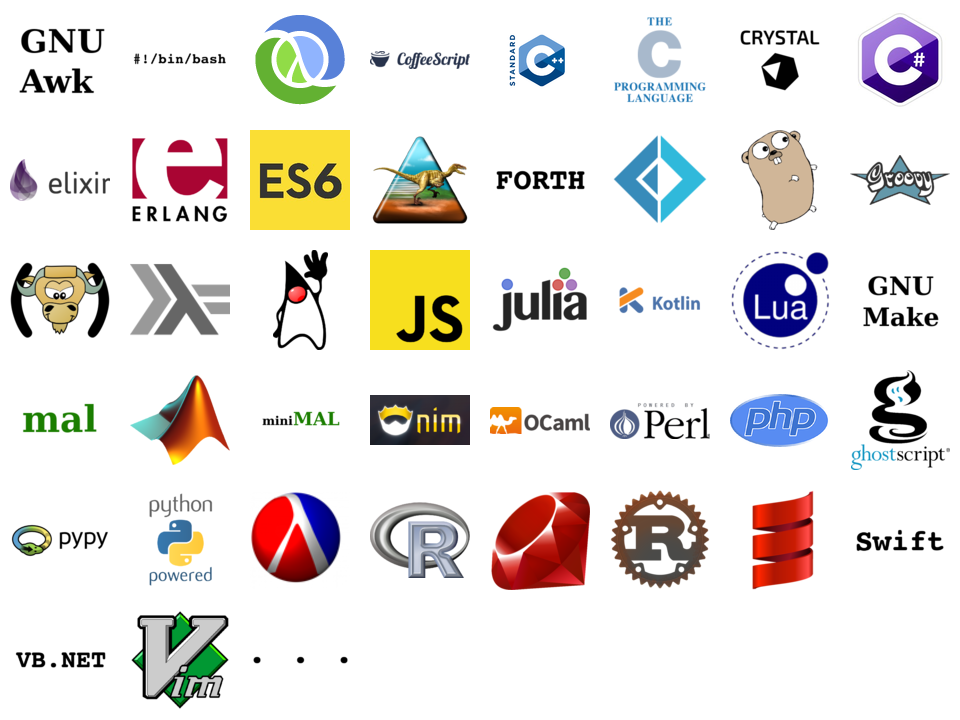Achievement Unlocked
A Better Path to Language Learning
Midwest.io 2015
Joel Martin
Press 's' to show speaker notes
About Me
Joel Martin (kanaka)
Principal Software Engineer at ViaSat, Inc
Clojure
Satellites!
Welcome to Polyglossia
- Groovy (2003)
- Scala (2004)
- Go (2009)
- Swift (2014)
- Clojure (2007)
- Rust (2010)
- Julia (2012)
- Dart (2013)
- Factor (2003)
- Nim (2008)
- Kotlin (2011)
- Crystal (2012)
The Best Languages for the Organization Task/Project System
It's a Polyglot World
Language learning is part of the job.
Learning is work!
Work is inherently difficult
The typical process:
- Hello world
- Function definition and calling
- Basic data types
- Basic flow control constructs
- Etc, etc, ad naseum
... or is it?
“Why will people pay for the privilege of working harder than they will work when they are paid?
-- The Game of Work: Charles Coonradt”
"Work" is not a thing, it's a state of mind.
The Inspiration
- Gherkin
- lispy

Mal Beginnings
JS
...
function read_form(reader) {
var token = reader.peek();
switch (token) {
// reader macros/transforms
case ';': return null; // Ignore comments
case '\'': reader.next();
return [types._symbol('quote'), read_form(reader)];
case '`': reader.next();
return [types._symbol('quasiquote'), read_form(reader)];
case '~': reader.next();
return [types._symbol('unquote'), read_form(reader)];
...
GNU Make
...
define READ_FORM
$(and $(READER_DEBUG),$(info READ_FORM: $($(1))))
$(call READ_SPACES,$(1))
$(foreach ch,$(word 1,$($(1))),\
$(if $(filter $(SEMI),$(ch)),\
$(call DROP_UNTIL,$(1),$(_NL)),\
$(if $(filter $(SQUOTE),$(ch)),\
$(eval $(1) := $(wordlist 2,$(words $($(1))),$($(1))))\
$(call _list,$(call _symbol,quote) $(strip $(call READ_FORM,$(1)))),\
$(if $(filter $(QQUOTE),$(ch)),\
$(eval $(1) := $(wordlist 2,$(words $($(1))),$($(1))))\
$(call _list,$(call _symbol,quasiquote) $(strip $(call READ_FORM,$(1)))),\
$(if $(filter $(UNQUOTE),$(ch)),\
...
"Make Lisp"
Bash
...
READ_FORM () {
local token=${__reader_tokens[${__reader_idx}]}
case "${token}" in
\') __reader_idx=$(( __reader_idx + 1 ))
_symbol quote; local q="${r}"
READ_FORM; local f="${r}"
_list "${q}" "${f}" ;;
\`) __reader_idx=$(( __reader_idx + 1 ))
_symbol quasiquote; local q="${r}"
READ_FORM; local f="${r}"
_list "${q}" "${f}" ;;
...
C
...
MalVal *read_form(Reader *reader) {
char *token;
MalVal *form = NULL, *tmp;
token = reader_peek(reader);
if (!token) { return NULL; }
switch (token[0]) {
case ';':
abort("comments not yet implemented");
break;
case '\'':
reader_next(reader);
form = _listX(2, malval_new_symbol("quote"),
read_form(reader));
break;
...
Python
...
def read_form(reader):
token = reader.peek()
# reader macros/transforms
if token[0] == ';':
reader.next()
return None
elif token == '\'':
reader.next()
return _list(_symbol('quote'), read_form(reader))
elif token == '`':
reader.next()
return _list(_symbol('quasiquote'), read_form(reader))
...
Clojure
...
;; Override some tools.reader reader macros so that we can do our own
;; metadata and quasiquote handling
(alter-var-root #'r/macros
(fn [f]
(fn [ch]
(case ch
\` (wrap 'quasiquote)
\~ (fn [rdr comma]
(if-let [ch (rt/peek-char rdr)]
(if (identical? \@ ch)
((wrap 'splice-unquote) (doto rdr rt/read-char) \@)
((wrap 'unquote) rdr \~))))
...
PHP
...
function read_form($reader) {
$token = $reader->peek();
switch ($token) {
case '\'': $reader->next();
return _list(_symbol('quote'),
read_form($reader));
case '`': $reader->next();
return _list(_symbol('quasiquote'),
read_form($reader));
case '~': $reader->next();
return _list(_symbol('unquote'),
read_form($reader));
...
Java
...
public static MalVal read_form(Reader rdr)
throws MalContinue, ParseError {
String token = rdr.peek();
if (token == null) { throw new MalContinue(); }
MalVal form;
switch (token.charAt(0)) {
case '\'': rdr.next();
return new MalList(new MalSymbol("quote"),
read_form(rdr));
case '`': rdr.next();
return new MalList(new MalSymbol("quasiquote"),
read_form(rdr));
...
An Accidental Discovery
"Make Lisp" became "Make-A-Lisp"
Mal Itself
Demo Time

Mal and More Mal
PostScript
...
% read_form: read the next form from string start at idx
/read_form { 3 dict begin
read_spaces
/idx exch def
/str exch def
idx str length ge { null str idx }{ %if EOF
/ch str idx get def % current character
ch 39 eq { %if '\''
/idx idx 1 add def
str idx read_form
3 -1 roll /quote exch 2 _list 3 1 roll
...
C#
...
public static MalVal read_form(Reader rdr) {
string token = rdr.peek();
if (token == null) { throw new MalContinue(); }
MalVal form = null;
switch (token) {
case "'": rdr.next();
return new MalList(new MalSymbol("quote"),
read_form(rdr));
case "`": rdr.next();
return new MalList(new MalSymbol("quasiquote"),
read_form(rdr));
...
Ruby
...
def read_form(rdr)
return case rdr.peek
when ";" then nil
when "'" then rdr.next; List.new [:quote, read_form(rdr)]
when "`" then rdr.next; List.new [:quasiquote, read_form(rdr)]
when "~" then rdr.next; List.new [:unquote, read_form(rdr)]
when "~@" then rdr.next; List.new [:"splice-unquote", read_form(rdr)]
when "^" then rdr.next; meta = read_form(rdr);
List.new [:"with-meta", read_form(rdr), meta]
...
Perl
...
sub read_form {
my($rdr) = @_;
my $token = $rdr->peek();
given ($token) {
when("'") { $rdr->next(); List->new([Symbol->new('quote'),
read_form($rdr)]) }
when('`') { $rdr->next(); List->new([Symbol->new('quasiquote'),
read_form($rdr)]) }
when('~') { $rdr->next(); List->new([Symbol->new('unquote'),
read_form($rdr)]) }
...
Go
...
func read_form(rdr Reader) (MalType, error) {
token := rdr.peek()
if token == nil {
return nil, errors.New("read_form underflow")
}
switch *token {
case `'`:
rdr.next()
form, e := read_form(rdr)
if e != nil {
return nil, e
}
return List{[]MalType{Symbol{"quote"}, form}, nil}, nil
...
Rust
...
fn read_form(rdr : &mut Reader) -> MalRet {
let otoken = rdr.peek();
let stoken = otoken.unwrap();
let token = &stoken[..];
match token {
"'" => {
let _ = rdr.next();
match read_form(rdr) {
Ok(f) => Ok(list(vec![symbol("quote"), f])),
Err(e) => Err(e),
}
},
...
R
...
read_form <- function(rdr) {
token <- Reader.peek(rdr)
if (token == "'") {
. <- Reader.next(rdr);
new.list(new.symbol("quote"), read_form(rdr))
} else if (token == "`") {
. <- Reader.next(rdr);
new.list(new.symbol("quasiquote"), read_form(rdr))
} else if (token == "~") {
. <- Reader.next(rdr);
new.list(new.symbol("unquote"), read_form(rdr))
...
CoffeeScript
...
read_form = (rdr) ->
token = rdr.peek()
switch token
when '\'' then [_symbol('quote'), read_form(rdr.skip())]
when '`' then [_symbol('quasiquote'), read_form(rdr.skip())]
when '~' then [_symbol('unquote'), read_form(rdr.skip())]
when '~@' then [_symbol('splice-unquote'), read_form(rdr.skip())]
when '^'
meta = read_form(rdr.skip())
[_symbol('with-meta'), read_form(rdr), meta]
when '@' then [_symbol('deref'), read_form(rdr.skip())]
...
VB.NET
...
Shared Function read_form(rdr As Reader) As MalVal
Dim token As String = rdr.peek()
If token Is Nothing Then
throw New MalContinue()
End If
Dim form As MalVal = Nothing
Select token
Case "'"
rdr.get_next()
return New MalList(New MalSymbol("quote"),
read_form(rdr))
...
Scala
...
def read_form(rdr: Reader): Any = {
return rdr.peek() match {
case "'" => { rdr.next; _list(Symbol("quote"), read_form(rdr)) }
case "`" => { rdr.next; _list(Symbol("quasiquote"), read_form(rdr)) }
case "~" => { rdr.next; _list(Symbol("unquote"), read_form(rdr)) }
case "~@" => { rdr.next; _list(Symbol("splice-unquote"), read_form(rdr)) }
case "^" => { rdr.next; val meta = read_form(rdr);
_list(Symbol("with-meta"), read_form(rdr), meta) }
case "@" => { rdr.next; _list(Symbol("deref"), read_form(rdr)) }
...
Haskell
...
read_form :: Parser MalVal
read_form = do
ignored
x <- read_macro
<|> read_list
<|> read_vector
<|> read_hash_map
<|> read_atom
return $ x
read_str :: String -> IOThrows MalVal
read_str str = case parse read_form "Mal" str of
...
Racket
...
(define (read_form rdr)
(let ([token (send rdr peek)])
(if (null? token)
(raise (make-blank-exn "blank line" (current-continuation-marks)))
(cond
[(equal? "'" token) (send rdr next) (list 'quote (read_form rdr))]
[(equal? "`" token) (send rdr next) (list 'quasiquote (read_form rdr))]
[(equal? "~" token) (send rdr next) (list 'unquote (read_form rdr))]
[(equal? "~@" token) (send rdr next) (list 'splice-unquote (read_form rdr))]
[(equal? "^" token) (send rdr next)
(let ([meta (read_form rdr)])
(list 'with-meta (read_form rdr) meta))]
...
Lua
...
function M.read_form(rdr)
local token = rdr:peek()
if "'" == token then
rdr:next()
return List:new({Symbol:new('quote'), M.read_form(rdr)})
elseif '`' == token then
rdr:next()
return List:new({Symbol:new('quasiquote'), M.read_form(rdr)})
elseif '~' == token then
rdr:next()
return List:new({Symbol:new('unquote'), M.read_form(rdr)})
...
OCaml
...
and read_form all_tokens =
match all_tokens with
| [] -> raise End_of_file;
| token :: tokens ->
match token with
| "'" -> read_quote "quote" tokens
| "`" -> read_quote "quasiquote" tokens
| "~" -> read_quote "unquote" tokens
| "~@" -> read_quote "splice-unquote" tokens
| "@" -> read_quote "deref" tokens
...
Mal Today

Putting the Fun in Language Learning
Buzzword alert: Gamification
Make-A-Lisp is gamification of language learning
Game of Work
- Goals
- Scorekeeping
- Choice
- Coaching
- Feedback
Goals
- Learn a New Language
- Learn About Lisp
- ---
- Create a Lisp (i.e. Mal implementation)
- Get Eternal
Glory (at
https://github.com/kanaka/mal)
- Getting your implementation into
the main repository
- First to implement a new target
- Something unique and interesting about your implemenation
- Getting credit for a re-implementation
- Getting your implementation into
the main repository
Scorekeeping
Measure of progress towards goal
- step0_repl
- step1_read_print
- step2_eval
- step3_env
- step4_if_fn_do
- step5_tco
- step6_file
- step7_quote
- step8_macros
- step9_try
- stepA_mal
- Echo program
- Syntax checker
- Simple calculator (prefix)
- Calculator with memory
- Simple Lisp Language
- Efficient stack/memory (Tail-calls)
- File I/O, eval, command line
- Code templating (quasiquote)
- User defined syntax (macros)
- Exception handling
- Self-hosting
Choice
Freedom to choose how to succeed
- Target language and tools
- Implementation decisions
- Optional steps/tasks
- step 5 / TCO
- readline editing/history
- metadata across all compound data-types
- keywords
- Deferrable (needed for self-hosting):
- step 5 / TCO
- vectors and hash-maps
- reader macros, comments
Coaching
- Step-by-step guide at blob/master/process/guide.md
- Psuedo-code for each step
- FAQ at blob/master/docs/FAQ.md
- #mal channel on freenode
Feedback
- Measuring change over time
- Frequent feedback
- In make-a-lisp feedback works like
this:
make test^MY_IMPL - Or:
make test^MY_IMPL^stepX
Game Overview (Turns)
- For each step:
- Choose a step task
- Google, stackoverflow, references, tutorials
- Implement/tweak until tests pass
- Repeat until step is done
Let's Play
- Round one
Your Turn!
- Learn a new language using mal
- Create an new implementation
- Improve the game
- Improve an existing implementation
- Make a cool logo for mal
- Do some language research with mal implementations
Questions?
Extra Material

New Implementation Ideas
- Something old
- Fortran
- COBOL
- Pascal
- Ada
- Assembly
- Something new
- Idris
- Io
- Dart
- Elm
- TypeScript
- Something borrowed
(from another domain)- TeX
- PL/SQL
- Prolog
- Verilog / VHDL
- Something blue
(corporate/government)- Objective-C
- PowerShell
- ColdFusion
- MUMPS (OpenM)